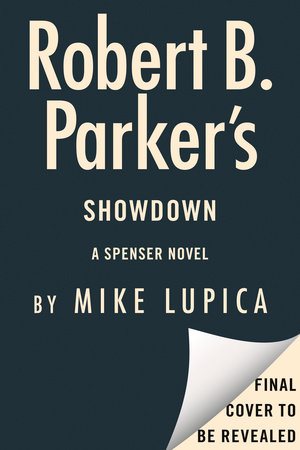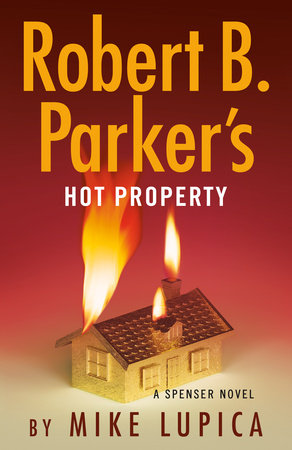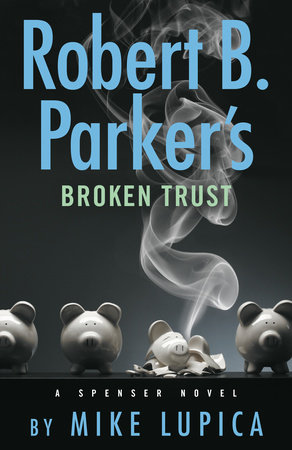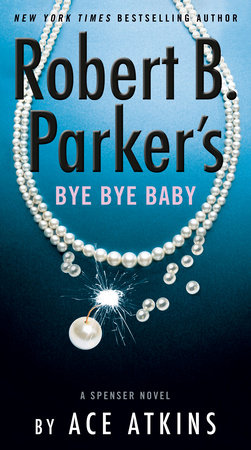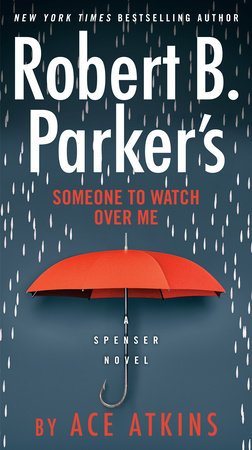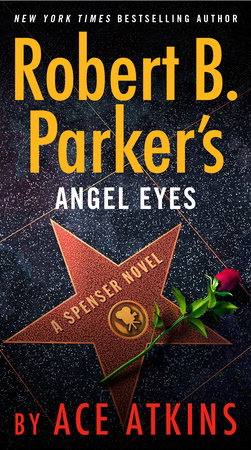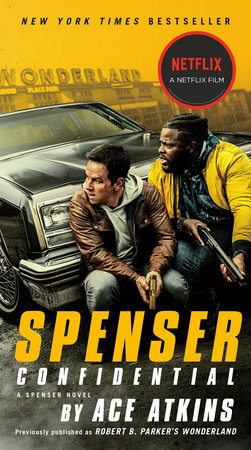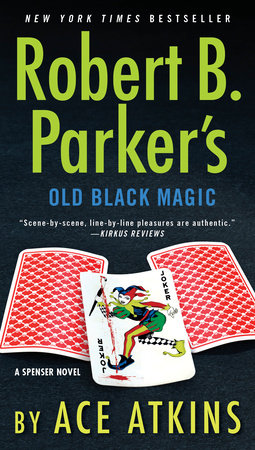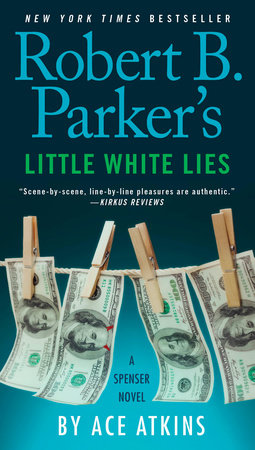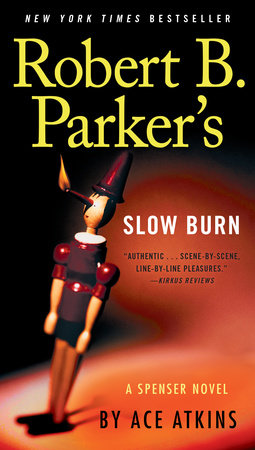Excerpt
Robert B. Parker's Showdown
One
Hawk was stretched out on the couch in my office, where I sometimes thought he had been since right after the Puritans had arrived.
He was wearing black exercise pants, Hoka sneakers with more colors in them than the Pride flag, and a Caitlin Clark T-shirt.
When I'd asked him about the T-shirt, he'd said, "Just my way of showing solidarity with that bad, bad girl."
The book he was currently reading-The Wingmen, about the friendship between Ted Williams and John Glenn-was currently closed and bookmarked across Caitlin Clark's No. 22. I'd long since accepted the fact that Hawk, when the spirit moved him, viewed my office as his personal reading room. Out of friendship, I felt it more flattering than calling him a squatter.
I pointed at his book now and said, "You don't even like baseball."
"Not reading it for the baseball shit, reading it for the war shit," he said. "I always thought I would have been the ass as a fighter pilot."
"You're assuming the Marines would have gotten past your rap sheet?" I said.
"Only if they wanted to win," Hawk said.
I sipped more coffee from the temperature-controlled mug Susan Silverman had bought for me, having figured out just this morning how to keep the coaster charged, and already knowing that I probably wouldn't stay with it for the long haul. When I'd phoned to tell her that I finally did have it working the way it was supposed to, I'd also mentioned that it was a good thing, since I liked my coffee the way I liked my women: hot.
Susan had said, "The twenty-first century just called, big boy. They're still holding a table for you."
I didn't get the chance to ask what she was wearing, as I so often did, because she'd already ended the call.
To Hawk now I said, "You're at least aware that Ted Williams was considered the greatest hitter of all time, right?"
"Only reason I am," he said, "is on account of it having sunk in after the first thousand damn times you told me."
"They called him the Splendid Splinter, you know," I said. "Also the Thumper. And Teddy Ballgame."
Hawk turned slightly toward me on the couch, his eyes looking so hooded I thought he might be on the verge of a nap even though it was only midmorning. But he'd pointed out on more than one occasion that baseball talk from me often acted as a powerful sedative for him.
"And down the rabbit hole we go," he said.
I had finally given in to peer pressure from him, even though Hawk constantly told me he had no peers, and purchased a longer couch, mostly so his feet no longer had to hang over the edge when he was reclining the way he was now. To my way of thinking, that made me at least as good a wingman as either Ted Williams or John Glenn had been. In my dreams, a larger couch also might be more functional in the future if I could ever again talk Susan into us using it for a midday flight of heavenly transport.
Or a reasonable facsimile thereof.
I had been slowly making my way through The Globe while Hawk had been reading his book. I still liked having a newspaper in my hands. But then, I was someone who considered texting to be the devil's handiwork.
I looked over at Hawk, whose eyes now seemed to be all the way shut, and felt myself smiling at my own wingman as I did, thinking about all the wars the two of us had fought together. In almost the same moment, he turned back to me as if reading my mind, and we'd already begun our next conversation. He could do that with alarming ease, much the way Susan Silverman could. It was concerning to me, if only because it chipped away at my notion of being a man of mystery.
"How long you figure we been doin' this, you and me?" he asked.
"By this," I said, "I assume you're referring to us doing our own patriotic bit to make the country a better and safer place."
Hawk smiled then, the smile coming up and out of him slowly and finally brilliantly, the way the sun did when it came up over the Harbor.
"Not necessarily better," he said, "for the ones we keepin' it safe from."
"You make a solid point there," I said.
"As I so often do," he said.
"But being the trained detective that I am," I said, "I sense that you're about to make a larger point."
"As I so often am," he said.
"Don't make me come over there and beat it out of you," I said.
He was smiling again. "If you do," he said, "and I find out about it . . ."
He sat up then, placed his book on the end table behind him, and walked over and poured himself a cup of coffee. I had offered to get him a temperature-controlled mug of his own. He had taken a hard pass on that, saying it would only make him drink more coffee. I told him that was the point.
"What I'm getting at," he said, "is if you ever wonder how long we're gonna keep doing whatever it is we've been doing for as long as we've been doing it."
"It sounds like you've been wondering about that very thing."
"Uh-huh."
"Are you considering a career change?" I said. "Because I'm thinking it might be a little late in life for you to do the Top Gun thing."
"Turn and burn, like my boy Tommy Cruise says," Hawk said.
"Good God, Watson," I said in a British accent that wasn't nearly as good as the one Hawk liked to use when he switched conversational gears. "Are you actually considering retirement? I still see you as being in your prime, my dear man."
"Ain't never been anywhere but my prime," Hawk said. "You're the one needs to be the late bloomer, not me."
"There is that," I said.
"Just been thinking lately about all the fighting you and me been doing, in the ring and out the ring, and for such a long-assed time," he said. "And wondering if you ever get tired of fighting."
"I do," I said. "The problem is, I have no other skills."
"Got to have at least one other," he said, "or Susan staying with you this long makes no sense whatsoever."
"It's sweet for you to have noticed," I said.
"We both know you didn't just buy this couch for me, even though you say you did," he said.
"A man can dream, can't he?" I said.
He stared at me now, face both serious and solemn at the same time.
"Any asshole you wouldn't be willing to help they came through the door asking you for it?" he said.
"Asking for help, you mean?"
"Uh-huh."
"Other than a New York Yankee?" I said.
"Other than that," Hawk said.
"It would have to be one raging asshole," I said. "And even then, you know me." I slid into my Bogart impression then, just to amuse myself. And because sometimes I couldn't help myself. "Trouble is my business, schweetheart."
"Told you never to call me that," Hawk said.
His face was still serious as he looked down at his book, all the usual irony and smart-ass completely absent, tapped the cover of his book with his index finger, looked back at me.
"Since I'm asking the questions today, here come one more your way, ball down the middle you could probably hit out the park like Ted Williams," Hawk said. "You think there's anything in this world could ever stop us from being wingmen?"
"Not a chance," I said. Then winked broadly and added, "Schweetheart."
I was wrong about that, as it turned out.
And nearly dead wrong.
Wasn't the first time.
Two
After Hawk left for what I suspected might be his own flight of heavenly transport, I immediately began thinking about lunch.
Occasionally I am thinking about lunch before I've had breakfast. You have to get out ahead of these things, or risk being run over later on. Susan had suggested recently that I thought about food more than I thought about sex, understanding the scope of that statement better than anyone.
I told her I was still looking for a graceful way to do both at once.
"You know how much I love you," she said, "but there really are several screws loose here."
"Do you think a good therapist might be able to help?" I asked.
"It might be too late for that, in which case you're screwed," she said. She smiled wickedly at me. "See what I did there?"
My two finalists for lunch this morning were Billy's Sub Shop on Berkeley Street or the Flour Bakery + Café on Clarendon. I was weighing the pros and cons of each, not that there were many cons to speak of, when Rita Fiore called.
"What's going on with the Incredible Hunk?" she said.
"I'm trying to decide where to have lunch," I said. "Which means that if you need me to save your life again right now, it's going to have to wait."
"You didn't save my life," she said. "You were tireless in finding out who tried to take it."
It was last year, and some very bad men had come after her because she'd had a very bad boyfriend, a politician who in the end made George Santos look more truthful than Honest Abe. She had been gunned down on the street where she lives in Beacon Hill. But with some help from my friends, I had found out who shot her and why, and made Rita's world a better and safer place this time around.
"A distinction without a difference," I said.
"May I stop by?" she said. "There's someone I'd like you to meet."
"A potential client?" I said.
"Perhaps," Rita said.
"Okay," I said, "but if so, he can't be a raging asshole. Hawk and I decided just this morning that I need to draw the line there once and for all."
"He's not," she said.
"And who, if I may ask, might this potential client be?" I said.
"He says he's Vic Hale's son," she said.
"Speaking of ragers," I said.
"He happens to be a son nobody knew Vic had," Rita said, before adding, "At least until now."
If Joe Rogan was the biggest podcast personality around, Vic Hale, Boston guy, was in the conversation about who might be the next biggest. And loudest. I wasn't a fan, even though I had once boxed with his late father, and had considered the father a friend. Now the son, a former pro wrestler and local radio host and even standup comic the way Rogan still was, had become one of the most powerful and popular media personalities in America.
His America, anyway.
Vic hated just about everybody who didn't look like him, his audience loved him passionately for it, and he had the downloads and page views and streaming numbers and all the other ways success was measured in his world to prove it. These were data points I knew as much about, really, as I did needlepoint. Mostly because I wasn't a podcast guy, something else that stamped me as being out of step with the modern world. Susan said it was just one more thing to add to a list that was starting to run longer than a Harry Potter novel.
Vic Hale didn't really hate everybody and everything. He liked cops. He absolutely loved the Second Amendment the way children loved their first puppies. He apparently still talked about Ronald Reagan the way young girls mooned over Taylor Swift.
In the America where just about everybody with a microphone, on radio or TV or in the podcast world, was shouting at us and one another more and more, Vic Hale now had one of the loudest voices in the bullhorn media. Vic Hale, Boston's own, as he was so frequently described.
And we sure were proud to have him.
"King of the mouth-breathers" is the way Hawk described him. Susan just called him that "awful, awful man."
Hale had achieved his earliest fame being on the front line of defending our borders, in what he described as the ongoing war between Them and Us. On the rare occasions when I heard a clip from his show somewhere, he always made it sound as if there was some kind of invading army of migrants and immigrants who'd already made their way to Old Ironsides.
And no matter how many politicians, all over the country, got in line after that, Vic Hale liked to brag that he had been there first.
"So why did Vic Hale's son come to you?" I asked Rita.
"It'll be easier for him to explain when we get to your office," she said.
"Can you at least tell me who the young man's mother is?" I said.
"A migrant from Guatemala," Rita said.
"Oh, ho," I said.
Three
Daniel Lopez was nearly my height, a lot leaner, and handsome enough to be in the movies, and had lost his mother, Marisol, when she was shot to death six weeks ago in Miami Gardens after withdrawing cash from an ATM not far from where they lived near Hard Rock Stadium. This all happened in his final semester at the University of Miami, by which time he'd already been accepted at Harvard Law.
He told me all of this quickly and dispassionately after taking one of the client chairs across from my desk. Rita Fiore was in the other chair, wearing a tight green dress that showed off the amount of leg she generally showed off in my presence. She'd told me once that she knew she had great legs and wasn't afraid to use them.
After Rita's near-death experience on Joy Street, Susan had softened her position on Rita, who, she believed, had consistently done everything except hire a skywriter to let me know how available she was to me, even knowing that nobody had a more significant other than I most significantly did with Susan. It didn't stop Dr. Silverman from occasionally mentioning how nice it was that Rita, even at her age, was still shopping at the come-and-get-it department.
Once they had settled into their chairs, Rita laid out and allowed Daniel Lopez to tell his story, at least the preamble to it, at his own pace and in his own way. As did I. You had to. He didn't know me and I didn't know him and this was at least the beginning of us knowing each other. Daniel already knew that I had a rough outline of an idea as to why he was here. He clearly wanted me to know how he got here before we all began talking about where he might go from here.


